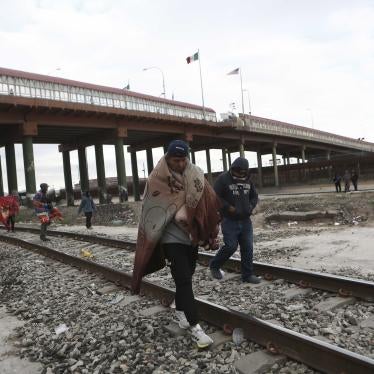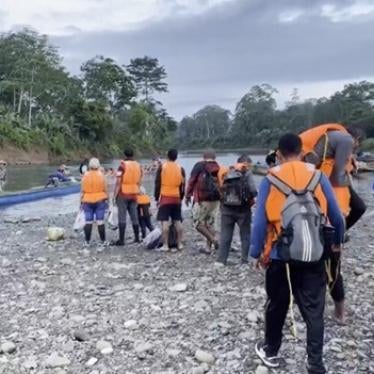Refugees are people who flee for their lives. Escape from danger and abuse is usually chaotic, sudden, desperate. The Biden administration’s rollout of its new policy for Venezuelan refugees seems oblivious to this refugee reality and risks doing more harm than good.
At the center of the Venezuela plan is a trade-off that would deny the right to seek asylum to Venezuelans who arrive at or irregularly cross the U.S. border and substitute for that a program that will allow up to 24,000 Venezuelans with sponsors in the United States who can support them financially to apply to enter the United States.
To be eligible under the administration’s new program, Venezuelans will need to have the means to fly at their own expense to airports within the United States and to obtain passports, which is complicated and expensive for many Venezuelans. Reuters reported that the cost of a passport in Venezuela is $200, nearly 10 times the country’s monthly minimum wage, and that only 1 percent of Venezuelans who left the country between June and August held a passport.
The inherent biases in this and other such trade-offs are obvious. Refugees who take to treacherous seas on rickety boats or walk through deserts and jungles would certainly fly to their destinations by plane if they could.
The reality of the Venezuelan exodus is that most of those who could afford to fly out to resettle voluntarily abroad did so years ago. Our research at Venezuela’s borders since 2018 shows that those who flee increasingly do so on foot, taking only what they can carry with them. The number of poor Venezuelans trekking the dangerous journey through the Darien Gap, a jungle between Colombia and Panama where they face abuse and violence, has skyrocketed, with almost 108,000 making the crossing between January and September compared with 2,819 in all of 2021.
Announcing the program on Oct. 12, Homeland Security Secretary Alejandro N. Mayorkas said Venezuelans who enter irregularly “will be returned to Mexico.”
He didn’t mention — and appeared to disregard — U.S. law, which recognizes that anyone who arrives in the United States has the right to seek asylum “whether or not at a designated port of arrival” and “irrespective of such alien’s status.”
The impact of this announcement, “effective immediately,” was the summary return to Mexico without examination of their asylum claims of any Venezuelans entering the United States without authorization. Mexico has given no assurances that it will examine their refugee claims or provide asylum to those who fear return to Venezuela. In fact, the 4,050 Venezuelans expelled to Mexico since the implementation of the policy have been given visas valid for only one week and instructed to leave the country.
The right to be protected as a refugee is not contingent on one’s mode of travel or on having proper government-issued documents. Yet the United States has previously attempted to stop asylum seekers from fleeing irregularly and to paper over the denial of that right with what are essentially immigration — not refugee — programs for processing limited numbers of relatively more secure and well-to-do applicants who could afford to wait their turn for inspection and admission.
Such trade-offs between asylum at the border and overseas processing occurred under the Orderly Departure Program in from 1979 to 1999 to stop boat departures of Vietnamese in favor of those who applied for resettlement from within Vietnam; the interdiction and return of Haitians combined with an in-country refugee processing program in the early 1990s; and the Obama administration’s Central American Minors Program, which required children seeking asylum from gangs and other abusers to wait in their Central American home countries to qualify for the program.
Providing safe and orderly overseas avenues to protection is laudable as a supplement to the right to seek asylum at borders, but not as a substitute for that right.
Pages of the U.S. playbook that deny asylum to undocumented survivors who flee irregularly by foot or boat in favor of those who are able to meet exacting criteria and fly with proper documents have been used by Australia for its “Pacific Solution,” which sent irregular maritime arrivals to detention in offshore islands while allowing plane arrivals to proceed with their claims.
Likewise, the European Union’s 2016 deal with Turkey called for the summary return of all asylum seekers arriving on the Greek islands to Turkey, while providing a resettlement option for limited numbers of refugees willing and able to wait in Turkey until their bids to fly to Europe had been approved.
With the Biden administration’s plan in effect, we might as well apply a blowtorch to Emma Lazarus’s welcoming poem at the foot of the Statue of Liberty and chisel in a new message: “Give me your well-rested, your well-to-do, your properly ticketed jet-setters yearning to breathe free.”









